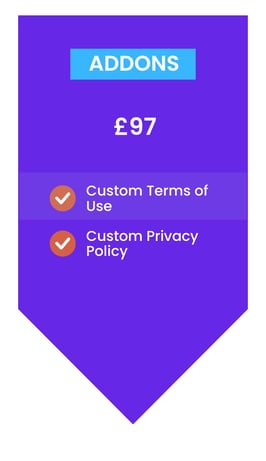

Both terms and conditions (T&Cs) and privacy policies are essential legal documents for websites and online businesses. To ensure compliance with the laws and regulations, here are the key legal requirements for each:
Terms and Conditions (T&Cs):
Clear and Transparent Presentation: T&Cs should be presented on your website in a clear and easily accessible manner. Users must have the opportunity to review them before using your website's services.
Acceptance Mechanism: Users should have the option to explicitly agree to your T&Cs. This agreement can be obtained through a "clickwrap" agreement (where users must click to accept) or a "browsewrap" agreement (where users are notified of the T&Cs and continue using the site, indicating their acceptance).
User Rights and Responsibilities: T&Cs should outline the rights and responsibilities of both users and the website owner. This includes details on acceptable use, prohibited activities, and how disputes will be resolved.
Intellectual Property Rights: If your website contains copyrighted material, trademarks, or other intellectual property, T&Cs should clarify ownership, usage rights, and any restrictions on copying or reproducing content.
Governing Law and Jurisdiction: Specify the governing law and jurisdiction that will apply in the event of a legal dispute. This helps determine which country's laws will be used to interpret the agreement and where legal proceedings will take place.
Privacy Policy:
Data Collection and Processing: Your privacy policy must clearly detail what types of user data you collect (including personal information), the purposes for which you collect and process this data, and the lawful basis for processing (e.g., consent, legitimate interests).
Data Sharing: Explain if and how user data is shared with third parties, including service providers, advertisers, or business partners. Specify the purposes for data sharing.
User Rights: Inform users of their rights under UK data protection laws, such as the right to access, correct, delete, or restrict their data. Include instructions on how users can exercise these rights.
Data Security Measures: Describe the security measures in place to protect user data from breaches or unauthorized access. Highlight your commitment to data security.
Cookies and Tracking: If your website uses cookies or similar tracking technologies, explain their purpose, and provide options for users to manage cookie preferences, as per the Privacy and Electronic Communications Regulations (PECR).
Contact Information: Include contact information for users to reach out regarding data-related inquiries or concerns.
Compliance with UK Data Protection Laws: Ensure that your privacy policy complies with UK data protection laws, such as the Data Protection Act 2018 (which incorporates the GDPR) and the Privacy and Electronic Communications Regulations (PECR).
If you require tailor-made terms & conditions and privacy policies without the accompanying hassle, we're here to assist you in crafting these documents for a fee.
Nevertheless, it's important to understand that the documents we supply should not be considered as legal counsel or necessarily suitable for your unique demands. We strongly advise seeking guidance from a legal expert to confirm their compliance and appropriateness for your specific business needs.


